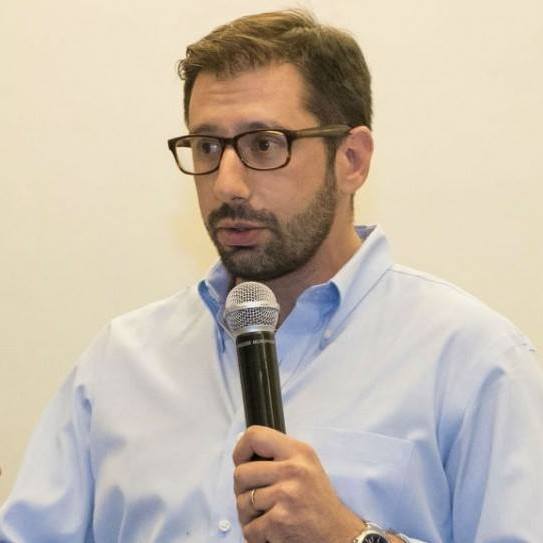“I want for Israel to maintain the moral upper hand. (not always easy), and I want to be able to be proud of Israel most of the time. I usually am proud, and definitely understand the complexity of this issue and still push for Israel to be morally responsible.“
The Interviewee – Rabbi Joshua Weinberg (Born 1978), President, ARZA (Association of Reform Zionists of America). Grew up in Chicago, made aliyah in 2003, and live in NY. Married with three young girls.
ARZA is the ZIonist arm of the Reform Jewish movement in America. It aims to promote Israel connections, education, and advocacy in Reform communities throughout America. Simultaneously, it works to support the Israel Movement for Reform and Progressive Judaism and, more broadly, works towards a more secure, pluralistic, and inclusive Israel.
In your opinion, what importance, if any, does the existence of a Jewish state have to you personally and to Jewish people in general?
“This could be a whole book, but I’ll try and answer succinctly. Personally, the Jewish State was the answer to my own quest for Jewish identity. I experimented with different kinds of mitzvot observance, and in the end realized that I needed to be a Jew in the Land and State of Israel. I believe very much in the verse ‘Ki MiTzion Tetze Torah’, and that Israel must be the center of Jewish life.
“I also believe that one of the greatest tragedies of the Zionist enterprise is that the two largest Jewish communities in the world don’t really understand each other. There is a strong disconnect, and I think that the existence of a Jewish State must be a source of inspiration for the Diaspora and that the Diaspora should be perceived as in a partnership with Israel not only for financial resources.”
Do you feel committed in some way to defend the future existence of Israel?
“Yes, of course. i served in the army (as a jobnik, but nonetheless), and try to imagine a world in which every Jew came to volunteer and serve. Of course, defending the future of Israel must move beyond taking up of arms.
“Where I see Israel in danger is through the threats to the basic fabric of Israel as a Jewish and Democratic state. Pushing and advocating for a harmonious relationship between Israel as a Jewish and Democratic state will ensure the future of Israel.”
Do you affiliate yourself with a specific denomination in Judaism? What is your view regarding the dominance of the Orthodox denomination in Israel religious establishment?
“I identify and work for the Reform movement and see the Orthodox monopoly over religious affairs and personal status issues as one of the most detrimental phenomena to the Jewish State and to Judaism. So many Israelis no longer identify themselves as one of the polarizing options of being either ‘religious’ or ‘secular’ and the time has come for the State to dismantle the Chief Rabbinate and democratize religion in Israel.“
Do you feel morally responsible for Israel’s actions (such as its management of the Israeli-Palestinian conflict?
“Yes. I want for Israel to maintain the moral upper hand. (not always easy), and I want to be able to be proud of Israel most of the time. I usually am proud, and definitely understand the complexity of this issue and still push for Israel to be morally responsible.”
In your opinion, what is the main thing Israelis fail to understand about the reality of being Jewish outside of Israel?
“Well, without generalizing too much, I would say that most Israelis are vastly unaware about non-Orthodox Judaism and the make up of Jewish identity for many non-Orthodox Jews.”
How would you describe Israel’s policy (formally and in practice) regarding its relationship with the Diaspora?
“I am glad that it has moved beyond an unofficial policy of ‘Shelilat HaGolah.’ I think the next phase must be an understanding that Hasbara does not change people’s minds and hearts, rather action. Diaspora Jews also have a responsibility here, and they/we must not make our relationship conditional. We must understand that we have a joint fate and a shared destiny.”
In your opinion, does Israel have an obligation to defend and help Jewish communities in need?
“I think it does. The relationship must be mutual and go both ways.”
Have you ever been to Israel? if you have, can you summarize your impression from the Israeli reality?
“I made aliyah in 2003 and relocated to New York in 2013.”
Can you tell us a bit about the Jewish community in your hometown? Is it organized? Are there any community activities?
“I live in Brooklyn and work in Manhattan. Lots of Jews, lots of Israelis.”
Is there a question you feel should be added to the project’s questionnaire?
“I would like to ask a question about taking action – What are actions steps that someone who does not live in Israel can take to be involved, in addition to donating funds?”

